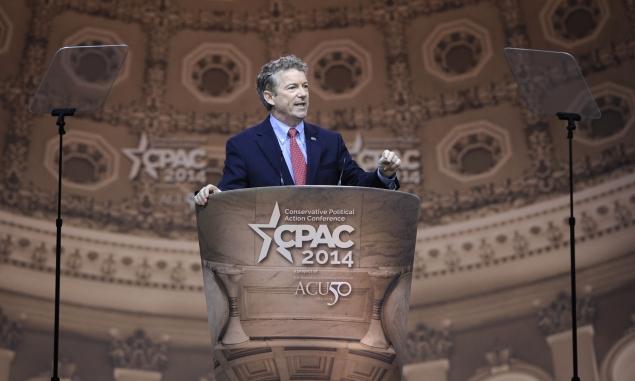Senator Rand Paul easily won the 2014 Conservative Political Action Conference’s annual presidential straw poll, taking 31 percent to second place Senator Ted Cruz’s 11 percent. As Rare contributor Jack Hunter points out, Rand won last year also, and he or his father, Ron, have won four of the last five CPAC straw polls.
Videos By Rare
Some may want to dismiss his straw poll victory, as many dismissed his father’s. But Rand is not his father. His blend of libertarian-leaning principles and political stands are increasingly matching those of an evolving conservative movement.
Rand is libertarian, but not too libertarian.
There is a growing libertarian element in the conservative movement, especially among younger conservatives. That libertarian leaning often transcends traditional party lines on issues such as NSA surveillance, the use of drones, especially to kill U.S. citizens, and the balance between liberty and security. Rand Paul has been part of that trend and is likely to benefit from it. Two examples:
Rand’s libertarian leaning is apparent in his reluctance to get involved in other countries’ internal affairs. That doesn’t make him an isolationist, a moniker some people accused his father of being, just a “reluctant interventionist.” That reticence has an appeal to conservatives, and in a country, who have grown tired of more than a decade of war and nation building.
Another libertarian trend that works in Rand’s favor is the growing federalism movement, a direct response to President Obama’s big-government expansionism. A Republican presidential candidate who limits himself to the constitutionally enumerated powers won’t be pushing most social issues because they belong to the states. Thus embracing federalism helps avoid dividing the GOP over social issues, at least at the federal level, which allows for building broader coalitions.
The need to act like a leader, not a bomb thrower.
Presidential candidates must convey the sense that they can work with others, including people in the other party.
Shortly after Dick Armey became House majority leader in 1995, one of his policy staffers told me that Armey would tone down some of his actions and rhetoric because he was in the leadership; he had to leave his bomb-throwing days behind (his office’s intramural baseball team was called Shoot the Wounded). That didn’t mean Armey set his principles or goals aside, he just had to act like a leader rather than a rabble-rouser.
It’s an important point. A politician can act independently, as Rand did in his 13-hour filibuster against Obama, but standing up doesn’t necessarily mean standing alone.
The need for balance between principle and consensus building.
As a congressman, people used to refer to Ron Paul as Dr. No, because he seemed to vote against everything that wasn’t a complete victory. The result is that very few of us in the policy world tried to work with his office on any issue; most people didn’t care where Ron Paul stood.
Rand has taken a different approach.
Some of the people who praise Ronald Reagan for his principled conservatism seem to forget that he often worked with liberal Democrats, including House Speaker Tip O’Neill, to pass major, free-market legislation. A conservative political leader has to be able to stand by his principles and yet build enough consensus to win some victories.
The need to appeal to young voters.
In his inaugural address, John F. Kennedy claimed that the torch had been passed to a new generation. Something similar may have happened when voters chose Obama over John McCain. Once that shift takes place, it is difficult to go back.
Nearly all of the potential GOP presidential candidates represent that “new generation.” Most are in their 40s or early 50s, as Obama was in 2008. Hillary Clinton will be 69 in 2016 and Joe Biden will be, gulp, 74. Who’s more likely to appeal to the younger crowd?
We’re a long way from 2016, and a lot of things can happen between now and then. Even so, it appears that Rand Paul is developing a message and a method that can appeal to conservatives, libertarians and younger voters. If he can continue that momentum, he’ll be more than a CPAC straw poll winner, he’ll be a strong contender in the GOP primaries.

